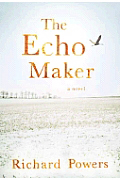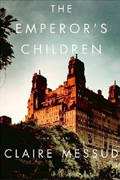
The Morning News Tournament of Books, sponsored by Powell’s Books, is an annual battle royale amongst the top novels in “literary fiction” published throughout the year. Read more about this year’s tournament »
» Buy the Books at Powells.com «
» Meet This Year’s Judges «
» Check the Bloggers’ Office Pool «
» Relive the Action: 2006, 2005 «
» Contact the Tournament Staff «
• ROUND ONE • MATCH TWO •
March 9, 2007
 |
The Echo Makerby RICHARD POWERS |

|
| v. | ||
The Emperor’s Childrenby CLAIRE MESSUD |
judged by MARCUS SAKEY
I realize the Rooster is structured like a basketball championship, but me, I’m more of a boxing fan. So, with that in mind:
In the Red Corner, weighing in at eight critically acclaimed novels, a MacArthur Fellowship, and a National Book Award, the poet of popular science, Riiiiiiichard Poooooowerrrrrrs!
And in the Blue Corner, sporting three novels and two novellas, a PEN/Faulkner Award and a Guggenheim Fellowship, subtle of sympathy and apt of metaphor, Claaaiire Messuuuuuuuuuuudd!
The crowd howls with anticipation, the two bump gloves and the bout begins.
But here’s the problem with boxing: Sometimes, even when you’re dealing with a couple of veterans, a fight doesn’t live up to expectations. It may be balanced, bloody, and sincere, and yet somehow not have that spark, that indefinable thing that makes it magic.
Which is how I felt about both books.
• •
The Echo Maker revolves around Mark Schluter, a 27-year-old Everyman who awakens from a coma with a rare syndrome that leaves him unable to recognize the people he most loves. This is understandably traumatic for his sister, who, though he admits she looks and acts like his sister, Mark believes to be an imposter sent to spy on him. It’s an interesting premise that gives Powers a platform to reflect upon the definition of consciousness, on the millions of biological and neurological steps that combine to create our visions of ourselves. The philosophical ramifications are fascinating: if what I think of as “me” is actually beyond my control, then what, exactly, am I?
That’s a question that The Emperor’s Children also wrestles with. At the heart of Messud’s novel about Manhattan intellectuals searching for validation and love (in that order) lies a question of identity. Of course, amidst the bantering bourgeois, personal identity depends on the opinion of others, and so all of her protagonists define themselves not by their own actions, but by their relationships to one another, and most especially to the aging and celebrated journalist who is the “emperor” of the title.
So far, so good. But a theme does not a novel make, and like boxers with great footwork but no arm, both novels dance around a lot without accomplishing very much.
The people in The Echo Maker aren’t people—they’re arguments, vantage points from which Powers can explore his ideas. They stagger about in ways that too clearly reveal the hand of the puppeteer, mouthing elaborate witticisms that serve symbolic purposes but ring false, like the husband and wife who nickname each other “Man” and “Woman,” as in, “Woman, can you pass the salt?” Try as he might to force emotional significance into the story, the book is all head and no heart.
In contrast, Messud’s characters are real enough to hold the door for you—though they wouldn’t. She has a wonderful eye for the subtleties that define us, and though her characters spend most of their time whining and bickering, she writes each with compassion and empathy that makes their inevitable collisions, and the damage that results, compelling and lyric.
Just not, ultimately, meaningful.
Maybe it’s me, but to rise to the kind of greatness conferred by our much-coveted Rooster, I feel a novel needs to not only mean something, but also do something; to excite not just the mind but also the soul. And while both books are admirably written and widely lauded, and both authors are worthy combatants, in the end, the fight simply didn’t live up to expectations.
Thus, without a knockout, we have to go to the judges. They’re tallying their score now, consulting amongst themselves, and the winner is…The Emperor’s Children, by a narrow margin.
As a novelist, I believe stories are first about people. If you can’t make me believe in the characters, I have a hard time buying into the philosophy—especially philosophy about the nature of character.
• About the Judge •
• From the Booth •
| I notice that whenever Manhattan intellectuals talk about boxing on NPR they always call it the “sweet science.” | Kevin | John | I can’t think of a book I’d rather read less than a “novel about Manhattan intellectuals searching for validation and love.” |
» Read Kevin Guilfoile & John Warner’s commentary on the match «

» DOWNLOAD THE BRACKETS «
• Round One •
Half of a Yellow Sun v. Absurdistan
judged by Brady Udall
The Echo Maker v. The Emperor’s Children
judged by Marcus Sakey
Firmin v. Brookland
judged by Sarah Hepola
The Second Coming of Mavala Shikongo v. The Road
judged by Maria Schneider
Arthur and George v. One Good Turn
judged by Kate Schlegel
The Lay of the Land v. English, August
judged by Colin Meloy
Alentejo Blue v. Apex Hides the Hurt
judged by Dan Chaon
Against the Day v. Pride of Baghdad
judged by Anthony Doerr
• Round Two •
Half of a Yellow Sun v. The Emperor’s Children
judged by Jessa Crispin
Firmin v. The Road
judged by Mark Sarvas
One Good Turn v. The Lay of the Land
judged by Maud Newton
Alentejo Blue v. Against the Day
judged by Sam Lipsyte
• SEMIFINALS •
Half of a Yellow Sun v. The Road
judged by Elizabeth Gaffney
One Good Turn v. Against the Day
judged by Sasha Frere-Jones
• ZOMBIE ROUND •
The Road v. Against the Day
judged by Andrew Womack
One Good Turn v. Absurdistan
judged by Rosecrans Baldwin

